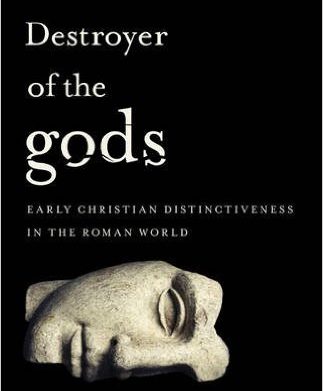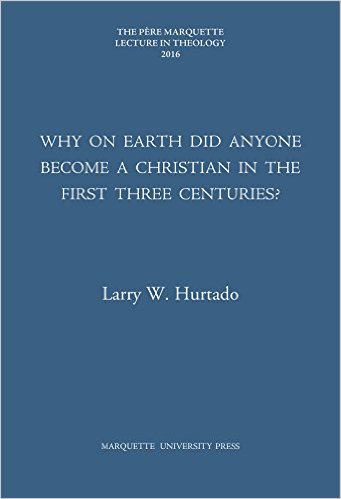Podcast: Play in new window | Download
Subscribe: Spotify | Email | RSS
 Why did Roman rulers and polemicists find early Christianity so alarming, rather than just another religion, like those of Rome’s many conquered peoples? In his new book Destroyer of the gods: Early Christian Distinctiveness in the Roman World (Baylor University Press, 2016), Dr. Larry Hurtado explores several ways in which this new Jesus-movement was different than its competitors in the religious marketplace of what we now call the first few Christian centuries. In this interview Dr. Hurtado answer questions such as:
Why did Roman rulers and polemicists find early Christianity so alarming, rather than just another religion, like those of Rome’s many conquered peoples? In his new book Destroyer of the gods: Early Christian Distinctiveness in the Roman World (Baylor University Press, 2016), Dr. Larry Hurtado explores several ways in which this new Jesus-movement was different than its competitors in the religious marketplace of what we now call the first few Christian centuries. In this interview Dr. Hurtado answer questions such as:
- How did ancient people think about the connection between one’s religion and one’s ethnic identity?
- Why was it so difficult to be a Christian in Roman society?
- Why was eating meat sacrificed to idols such a living issue for Paul’s churches?
- Why did early pagan critics of Christianity call them “haters of mankind,” and “atheists”?
- If it was so difficult to be a Christian in an ancient pagan society, why did so many people choose to become Christians?
[spp-tweet tweet=”Why did Roman rulers and polemicists find early Christianity so alarming?”]
Links for this episode:
- Larry Hurtado’s blog
- podcast 100 – Dr. Larry Hurtado on God in New Testament Theology
- podcast 99 – Dr. Larry Hurtado on early high christology
- Dr. Hurtado’s books
- Destroyer of the gods: Early Christian Distinctiveness in the Roman World
- Why on Earth Did Anyone Become a Christian in the First Three Centuries?
- Commentary on Mark
- One God, One Lord: Early Christian Devotion and Ancient Jewish Monotheism, 3rd ed. (kindle)

- Lord Jesus Christ: Devotion to Jesus in Earliest Christianity (kindle)
- How on Earth Did Jesus Become a God? (kindle)
- The Earliest Christian Artifacts: Manuscripts and Christian Origins (kindle)
- God in New Testament Theology (kindle)
- Origen, Against Celsus / Contra Celsum (a long reply to an early anti-Christian polemic by a learned pagan named Celsus)
- Isis, Mithras
- Letter to Diognetus
- the letter of Pliny to Emperor Trajan
- Gore Vidal
- 1 Corinthians 8:1-13, 1 Corinthians 10:14-33; 1 Peter 2:11-25; 1 Thessalonians 2:14-16.
- This week’s thinking music is “Warmer” by Andy G. Cohen. Released under a Creative Commons Attribution International License. https://andyg.co/hen/

Pingback: Podcasts on “Destroyer” | Larry Hurtado's Blog
Hi,
I thought this podcast with Hurtado was an interesting interpretation of the socio-policitcal circumstances and issues that might have been pertinent to the daily lives of some of the earliest Christians.
However, from a biblical perspective, I think it’s evident that the apostolic churches were being troubled by their law-zealous Jewish opponents (who were denying that Jesus was the Christ) and not their Roman neighbors. There is little (if any) indication that the apostles were concerned about portraying the worship of Jesus as a stark contrast to ordinary Roman religious life.
One can find substantial evidence (especially in the Gospels and Acts) that the apostolic writers portrayed the Roman world in a positive light. For example, Jesus doesn’t forbid paying taxes to Caesar and there are Roman officials who are commended for having greater faith than most of the Jews. Moreover, it is the Roman government that continually secures the safety of the Apostle Paul while he is in Jerusalem and takes the gospel throughout the synagogues of the Empire.
Dr Hurtado was talking about history including all the data not just the New testament time/documents.
Roman,
Yes, but I got the impression he was trying to make it seem relevant to the apostolic era (with the occasional references to scripture). Something that was “history” several hundred years later isn’t necessarily consistent with what we find in the biblical data.
The New Testament literature only covers the period up to end of 1st century. The academic study of early Christianity covers 1st to about 4th century. The pagan critics of Christianity call them “haters of mankind,” and “atheists”were relevant from 2nd century onwards, not “several hundred years”.
Hwl,
Even if it was only a couple generations later, it isn’t relevant to the apostolic era. Nobody was calling anyone in the apostolic churches a “hater of mankind” or an “atheist.”
Comments are closed.